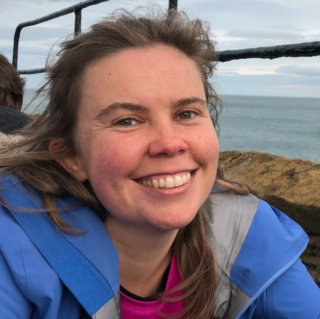Alison Convey
 Alison is a GP, medical educator and theatre director – a rare combination of talents that informed her work during the Humanising Care Fellowship.
Alison is a GP, medical educator and theatre director – a rare combination of talents that informed her work during the Humanising Care Fellowship.
Verbatim theatre is a theatre-making technique that takes real-life spoken word and places it on stage. It is an approach used by several theatre companies who have made work based on testimonies on issues ranging from the ‘London Road’ murders to the Post Office scandal.
Alison’s aim for her Humanising Care Fellowship was to consider what can make primary care more human, through the creation of a piece of verbatim theatre that would “put patients’ stories centre-stage”, and support training for medical students by exposing them to the lived experiences of patients.
With time on the Fellowship limited, Alison referred to an archive of transcribed interviews about patients’ experiences. The Health Experience Research Group (HERG), at the Nuffield Department of Primary Care Health Services at Oxford University. categorises over 4,000 patient interviews into different conditions. Alison chose to focus on a collection of 74 interviews with patients with urogynaecological symptoms, as these are stories she regularly encounters in her work as a female GP.
Findings
She conducted a thematic analysis of the stories in her dataset, to draw out common themes. Alison found the process of compiling verbatim theatre to have a number of parallels with qualitative research, with phases such as defining the scope of the work, interviewing people to get data, ethical considerations, and dissemination/performance.
Her analysis uncovered a range of issues from patients’ testimonies, including access, communication, whether they were listened to or dismissed, and continuity of care. The stories also revealed some unexpected findings. For instance, she found that many patients put a lot of thought into preparing for appointments, so that they can tell their story clearly. She also noted that many patients felt a need to be examined, even if the doctor isn’t sure of the clinical need for an examination. There was a great deal of humour in people’s stories – a human response to coping with adversity in their lives.
Outputs and impact
Having identified a set of key themes, she brought several stories together into an audio recording to test the concept and find out what it would be like to hear some of these stories spoken out loud.
Alison presented her work to date at the Society of Academic Primary Care, which sparked conversations with people about using theatre and the creative arts to disseminate or give wider voice to their research. She found that other doctors are excited about creative and innovative ways to educate future doctors. Her thematic analysis and reflections on the links between qualitative research and verbatim theatre are the subject of forthcoming research papers.
Her next steps are to conduct more research and interviews and to create an overarching narrative that knits the different strands together into a piece of theatre. Alison has forged a partnership with Human Story Theatre and is seeking funding to take the work forward with them.